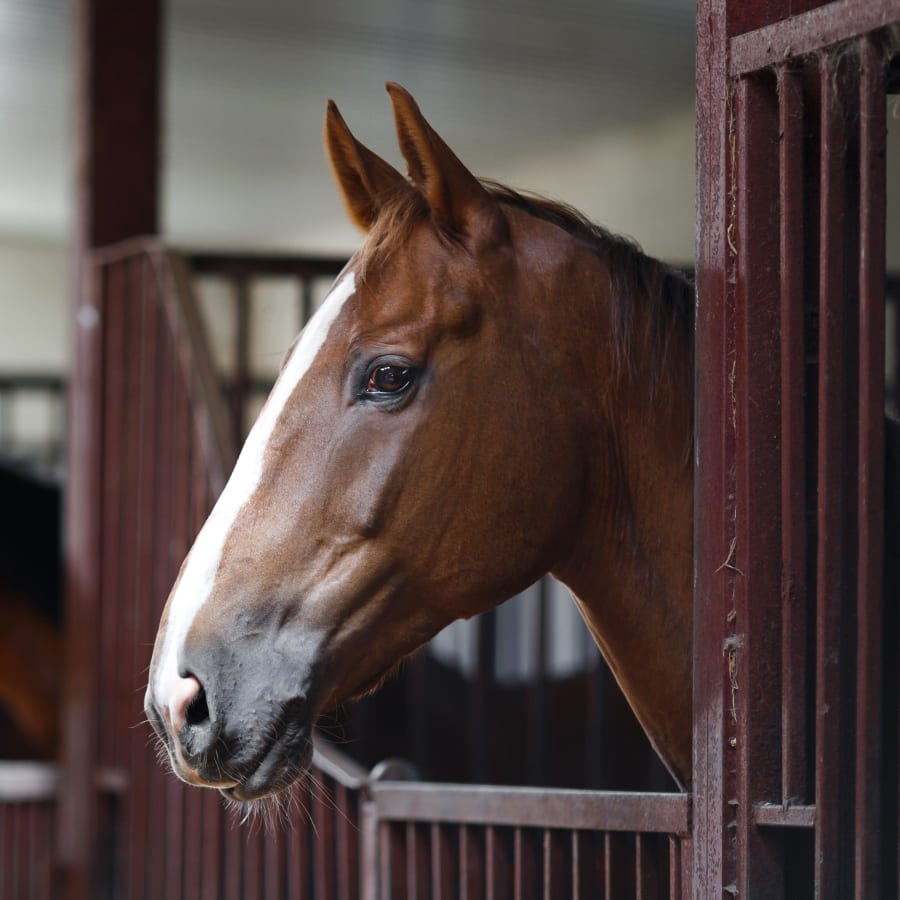Equine Protection & Prevention
At Western Veterinary Hospital, we believe that prevention is the best medicine! We provide routine health care for horses including annual wellness exams, vaccinations, parasite control, and on-site Coggins testing.
Keeping your horse's vaccinations up-to-date helps to prevent or lessen the severity of life-threatening or infectious diseases. Vaccination recommendations are based on the age of the animal, the animal’s exposure to potential infections, and geographic location.
Preventive care gives your horse the best chance at a long, healthy life. Our team will work with you to create a custom preventive care plan that is tailored to their unique needs, lifestyle, and potential risk,

Types of Vaccinations For Horses in San Angelo
Our vets will put together annual vaccination recommendations for your horse, in accordance with AAEP guidelines, and customize a vaccination protocol for your particular horse, stable, and situation.
The following are the two different categories of equine vaccinations that our vets provide.
Core Equine Vaccinations
Core vaccines are essential for protecting the health of all horses against common equine diseases.
The five core diseases that all have significant fatality rates in equine animals are:
- Eastern and Western Equine Encephalomyelitis
- West Nile Virus
- Tetanus
- Rabies
All horses can be exposed to these potentially fatal diseases and need to be vaccinated annually according to the American Association of Equine Practitioners.
Risk-Based Equine Vaccinations
The following vaccinations are given if your horse's lifestyle puts them at increased risk:
- Equine influenza virus
- Herpesvirus
- Strangles
- Equine viral arteritis
- Rotaviral diarrhea
- Leptospirosis
- Potomac horse fever
- Botulism
- Anthrax
- Snake bites
The Importance of Dewormers for Herd Health
Internal parasites are silent killers, causing extensive internal damage without you realizing your horses are infected. They lower horses’ resistance to infection, rob horses of valuable nutrients, and can cause damage to your animals' internal organs.
The most useful tool in our deworming programs is the fecal egg count, an exam of feces for parasite eggs. This test allows us to determine which parasites are present and whether your horse is shedding eggs. Our vets use this information to develop a deworming program specifically for your horse and to monitor its effectiveness.
While most horses shed very few worm eggs, some will shed high numbers of eggs and are more likely to infect other members of the herd. Internal parasites can cause numerous health issues in horses, such as colic, anemia, ill-thrift, and diarrhea.
Types of Dewormers in Equines
Based on the results of your horse's fecal exam, our vets will recommend whether you need to deworm your horse.
The common types of equine dewormers are:
- Fenbendazole
Targets roundworms, bloodworms, and pinworms.
- Ivermectin
Targets all parasites except tapeworms. However, resistance to ivermectin is high in roundworms.
- Ivermectin and Praziquantel
Targets all parasites. However, resistance to ivermectin is high in roundworms.
- Moxidectin
Targets all parasites except tapeworms. However, resistance to moxidectin is high in roundworms.
- Moxidectin and Praziquantel
Targets all parasites. However, resistance to moxidectin is high in roundworms.
- Pyrantel
Targets bloodworms, pinworms, and roundworms.
Common Parasites in Equines
Several common parasites can cause health problems for horses.
The following are both internal and external parasites that our San Angelo vets recommend deworming against.
- Roundworms
Most common in horses less than one-year-old and very old animals due to decreased immunity. They migrate through the trachea and live in the small intestine
In younger horses, roundworms may cause poor growth and development as well as respiratory issues. Young animals that have bad cases of roundworms can have intestinal obstructions leading to colic or even death.
Older affected horses may have a poor hair coat, weight loss, or decreased performance
- Bloodworms
These worms can migrate through the arteries around the large intestines and cause colic. Bloodworms used to be a major problem in horses, but their occurrence and significance has decreased with appropriate deworming
- Cyathostomins
This type of parasite lives in the large intestine and migrates into the wall of the intestine. Cyathostomins cause severe gastrointestinal signs such as decreased appetite and diarrhea.
Resistance to dewormers is increasing in these worms, so targeted deworming is especially important
- Pinworms
Pinworms are most common in horses younger than two years old or horses with poor management. These worms live in their large intestine and deposit their eggs around the horse's anus, causing them to have an itchy hind.
It’s difficult to treat and control pinworms so good horse and pasture management is important.
- Tapeworms
Horses become infected with tapeworms by eating small pasture mites during grazing. These worms attach to areas of the bowel lining causing thickening, inflammation, and ulceration of the intestinal wall. Since these worms spend part of their life living on mites, they are difficult to control.
Tapeworms don’t seem to cause many diseases in horses. While colic is considered a risk with this type of worm, the incidence is quite low.
- Bots Flies
Bots flies lay their eggs on the horse’s coat in late summer and early fall. The eggs show up as small yellow specks, mainly on the horses’ legs. Horses ingest bot eggs while licking or scratching their legs, then the eggs develop into larvae in the equine stomach and small intestine.
Bots fly larvae are passed out through feces and will hatch in the spring. Botflies will rarely cause clinical signs in horses, but they may cause gastric ulcers.
New Patients Welcome
Western Veterinary Hospital is accepting new patients! Our experienced vets are passionate about the health of San Angelo companion animals. Get in touch today to book your pet's first appointment.

